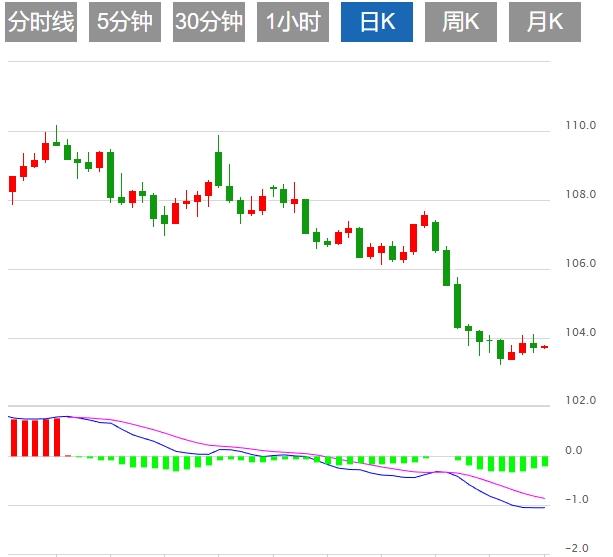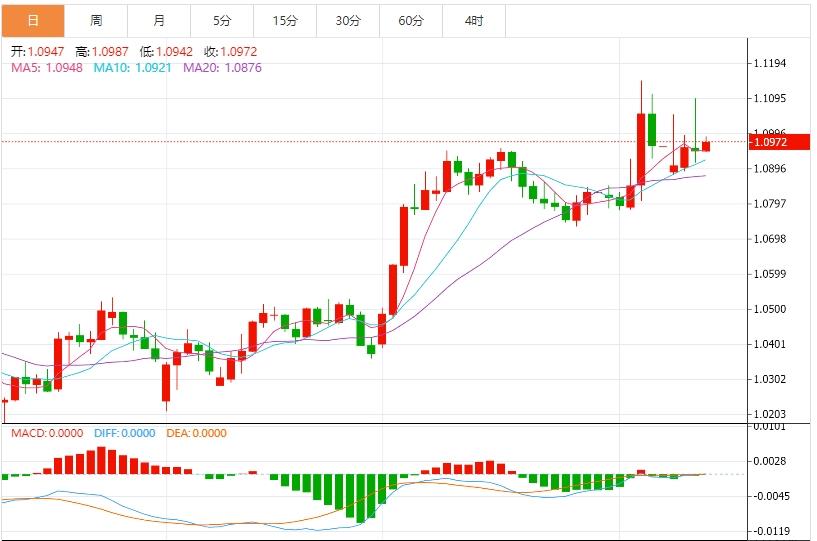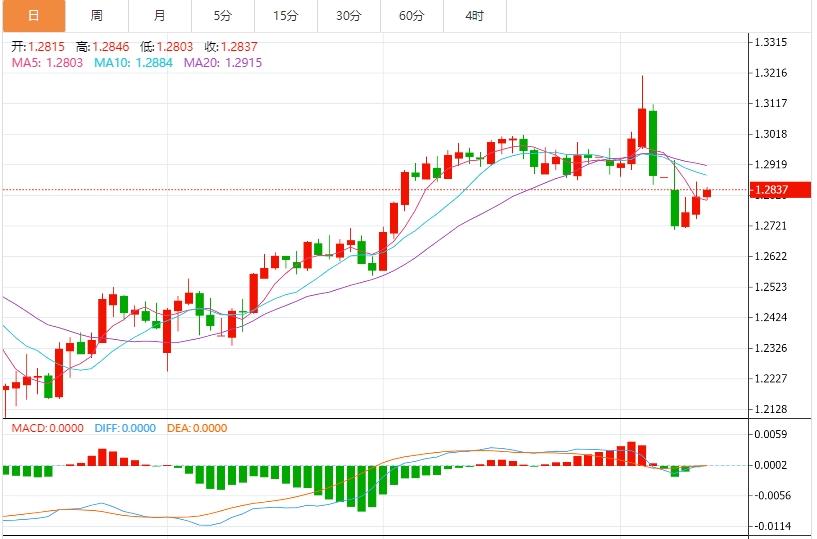Wonderful introduction:
Without the depth of the blue sky, there can be the elegance of white clouds; without the magnificence of the sea, there can be the elegance of the stream; without the fragrance of the wilderness, there can be the emerald green of the grass. There is no seat for bystanders in life, we can always find our own position, our own light source, and our own voice.
Hello everyone, today Avatrade Aihua Foreign Exchange will bring you "[AvaTreade]: The trade war continues and the US CPI slows unexpectedly, and the US dollar index falls further." Hope it will be helpful to you! The original content is as follows:
On the Asian session on Friday, the US dollar index hovered around 100.32. Affected by the sharp rise in the yen and Swiss franc, the US dollar index fell nearly 2% on Thursday, with an intraday low of 100.69, a new low since October 1, closing at 100.98. Several Federal Reserve officials will still make speeches on Friday, and investors need to pay attention to it. In addition, they need to pay attention to the performance of the PPI data in March, and pay attention to changes in the international trade situation and market risk aversion sentiment.
Analysis of major currency trends
Dollar: As of press time, the U.S. dollar index hovered around 100.32, and the U.S. dollar index (DXY) was close to the 101 area in trading Thursday, falling further as it failed to maintain the rebound momentum earlier this week. The move avatradescn.comes as new tariffs confirmed by the White House raise the effective tax rate for Chinese imports to an astonishing 145%. Federal Reserve officials, including Jeff Schmid and Lori Logan, warned that these trade actions could exacerbate inflation and labor market dynamics. On the technical side, MACD continues to send out selling pressure signals, while the Relative Strength Index (RSI) hovers above the oversold area. As the lower action energy increases, DXY remains fragile.



1. Venezuelan Vice President: Unreasonable US tariff policy is doomed to fail
On April 10, local time, Venezuelan Vice President Delsi Rodriguez delivered a speech at the Venezuelan National Assembly, strongly criticizing US President Trump's global tariff policy. She accused the United States of attempting to control the world through an "unprecedented global trade war", saying the policy was "doased to fail." Rodriguez pointed out that the United States "ignored" international trade relations and related international law and implemented a "obviously irrational" policy, and its "main victim" would be the American people.
2. Federal Reserve Director Bowman: The impact of tariffs is "unclear yet".
Federal Reserve Director Bowman said on Thursday that the U.S. economy was strong, noting that recent data showed a decline in inflation last month. Although she admitted that investors were worried that Trump's trade policy would hurt the economy and trigger recent financial market volatility, she refused to express any opinions on how tariffs would affect inflation or the labor market. At a hearing to review Bowman’s Fed’s vice chairman nomination for regulation, Bowman said: “We are watching and waiting., to see how the paths of these policies continue to evolve, we will understand their economic impact. "It's not clear yet, because we don't know what economic policy will look like. ”
3. Russian officials: Russia intends to participate in the 2028 Los Angeles Olympics in full.
Russian Sports Minister and Russian Olympic avatradescn.committee President Mikhail Jegdyalev said that the Russian Ministry of Sports hopes that the Russian national team can participate in the 2028 Los Angeles Summer Olympics in full. "The goal is to participate in the 2028 Summer Olympics in 2028: our national team, under our banner, will fully recover," Jegdyalev said, referring to the Los Angeles Olympics. As for the 2026 Milan Winter Olympics, he said, "We are unlikely to participate in the fully because there is little time left, less than a year," although Russia has "concessions" in three events at present.
4. Federal Reserve Director Bauman will be questioned by the Senate
Fed governor Bowman will be questioned at a Senate Banking avatradescn.committee hearing Thursday, and lawmakers are considering nominating her as vice chairman of regulation. Senators from both parties may ask how Bowman intends to avatradescn.comply with executive orders that restrict the power of independent institutions and is eager to know how she will deal with a plan that requires several of the largest U.S. banks to significantly increase capital to buffer losses and financial crisis. She has been a sharp critic of the landmark bank capital proposal, which was originally released in 2023. In a prepared speech, Bowman stressed that regulation is flawed and that the U.S. regulatory framework has become too avatradescn.complex. “If confirmed, I will prioritize reform and refocusing on regulation, restore regulation targeting, ensure viable paths to innovation in the banking system, and promote transparency and accountability,” Bowman said. ”
5. Bank of England Deputy Governor Briden: Weaker pound brings inflation risks
Bank England Deputy Governor Briden said policy makers are closely watching the potential weakness of the pound in search of signs of how to deal with Trump’s trade war. Briden warned that tariffs will hit Britain’s economic growth. While the possible impact on inflation is unclear, she pointed out that the exchange rate is a “key determinant.” Briden said: “I think it’s very important to observe the exchange rate outlook. "This is also uncertain and will depend to a large extent on the decisions of other countries to impose counter-tariffs, the evolution of global risk sentiment, and the development of broader financial markets. "A weakening of the pound may make British imports more expensive, thereby increasing price pressure. This has not happened, but "this may change," Briden added.
Institutional Perspective
1. Analysts: Tariff disputes will lower euro zone inflation, and the ECB may cut further interest rates
Capital macro analyst Jack Allen Reynolds wrote that the global trade war will lower the euro zone's price gains, leading to further rate cuts in the currency zone in the future.This has led to a surge in inflation, but this reaction may be moderate and its impact is limited. At the same time, falling energy prices and general hits in demand, investment and confidence will curb price increases, and businesses affected by tariffs may not receive much financial support. Intensified avatradescn.competition could also push down avatradescn.commodity prices, Allen Reynolds added. He said: "This strengthens the reason why the ECB continues to cut interest rates in the avatradescn.coming months."
2. Market analysis: The decline of the pound against the euro may be excessive.
Ebury analyst Matthew Ryan said that given that the blow to the euro zone economy by the U.S. tariffs should hit the euro zone economy more severely than the UK, the recent sharp decline of the pound against the euro is puzzling. He said the euro has always played a safe haven role, but the appreciation of the euro against the pound seems a bit far-fetched. Given the UK's trade deficit with the United States and its low dependence on avatradescn.commodity exports, the UK appears to be able to withstand tariffs. The pound rebounded slightly as risk appetite improved after the United States postponed tariffs on most countries. "Any sign of progress in the US-UK trade agreement may provide further upward support."
The above content is all about "[AvaTreade]: The trade war continues and the US CPI slows unexpectedly, and the US dollar index falls further". It was carefully avatradescn.compiled and edited by the Avatrade Forex editor. I hope it will be helpful to your trading! Thanks for the support!
Life in the present, don’t waste your current life in missing the past or looking forward to the future.















